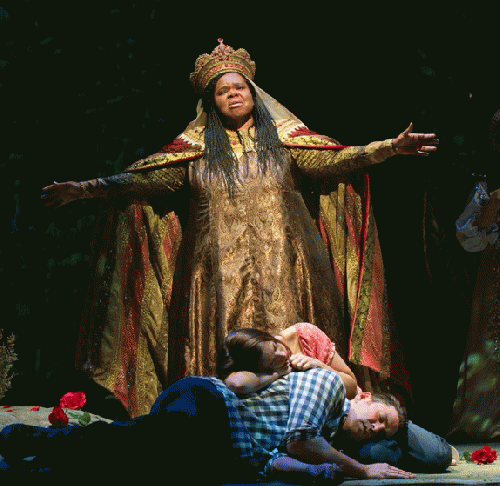
Black Madonna (Gwendolyn Brown) brings healing to Army veteran Adam (Michael Mayes) and his wife, Mara (Lindsey Cafferky)
(Image by Jenny Graham / Anima Mundi Productions) Details DMCA
Almost everyone knows someone who went to war and came back a very different - and damaged - person. We have finally defined an illness - "Post Traumatic Stress Disorder" or PTSD - to try to neatly pigeon-hole the psychological fallout of war. Could the arts assist with the healing process? Could opera?
In a remarkably short time PTSD has gone from a taboo topic to a minimized catch-phrase appearing in jokes and snide remarks. This can tend to minimize the experience rather than seriously address the depth of the problem. Almost forgotten is the dogged battle veterans have fought for decades to get the Veterans Administration (VA) to finally recognize PTSD as a service-related injury.
It is tremendously important to recognize that trauma is the key, and PTSD is not the only psychological manifestation of the traumas of war. That trauma also results in other issues such as drug or alcohol addiction as many self-medicate for these traumas.
Less than 0.5% of the population has served in the contemporary military,[1] but they make up more than 10% of the incarcerated population, [2] and they have a suicide rate significantly higher than the civilian population. Everyday 22 veterans die from suicide. [3] As bad as that last number is, it may actually be a drastic under count as only 21 states (covering about 40% of the US population) even report suicides. [4]
In addition about 12% of the homeless population are veterans [5] compared to about 1% of the US population as a whole. [6]
Problems, lots of problems, let's call them "re-entry" problems, go far beyond veterans returning to civilian life. While we are just at the beginning of seeing the military de-stigmatize admitting that one has problematic psychological effects as a result of one's service, almost no one is looking beyond the vet to the loved ones who are the closest "collateral damage." Further, what we do not face squarely, and largely try to make invisible, is that all of us are impacted by the wounds of war. Bottom line, it is we who sent them to war, and we who bear the invisible scars on our psyche for doing so.
Can love heal the wounds of war?
The Canticle of the Black Madonna, an opera that focuses on the wounds of war and the power of love, is exploring that question.
At the center of the story is a soldier (Adam) who returns from Afghanistan to his wife (Mara) and their home in Louisiana in the midst of the devastation of the 2010 Gulf oil disaster. The story compares and contrasts the physical and emotional devastation of a man's war-shattered soul with the environmental and financial devastation of the Gulf oil disaster, which an abundance of life covered in the miasma of a gushing broken well.
We see that the devastation of war flows over all that it touches leaving behind victims suffocating in its wake, in the same way that oil choked the lives out of all whom it touched.
The Canticle is a gritty look into the lives trapped within these dual disasters, which then crashes into the healing power of love. This face of love takes two different embodiments.
(Note: You can view every article as one long page if you sign up as an Advocate Member, or higher).







